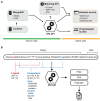The IPD-IMGT/HLA Database
- PMID: 36350643
- PMCID: PMC9825470
- DOI: 10.1093/nar/gkac1011
The IPD-IMGT/HLA Database
Abstract
It is 24 years since the IPD-IMGT/HLA Database, http://www.ebi.ac.uk/ipd/imgt/hla/, was first released, providing the HLA community with a searchable repository of highly curated HLA sequences. The database now contains over 35 000 alleles of the human Major Histocompatibility Complex (MHC) named by the WHO Nomenclature Committee for Factors of the HLA System. This complex contains the most polymorphic genes in the human genome and is now considered hyperpolymorphic. The IPD-IMGT/HLA Database provides a stable and user-friendly repository for this information. Uptake of Next Generation Sequencing technology in recent years has driven an increase in the number of alleles and the length of sequences submitted. As the size of the database has grown the traditional methods of accessing and presenting this data have been challenged, in response, we have developed a suite of tools providing an enhanced user experience to our traditional web-based users while creating new programmatic access for our bioinformatics user base. This suite of tools is powered by the IPD-API, an Application Programming Interface (API), providing scalable and flexible access to the database. The IPD-API provides a stable platform for our future development allowing us to meet the future challenges of the HLA field and needs of the community.
© The Author(s) 2022. Published by Oxford University Press on behalf of Nucleic Acids Research.
Figures



References
-
- Robinson J., Bodmer J.G., Malik K., Marsh S.G.E.. Development of the international immunogenetics HLA database. Hum. Immunol. 1998; 59:17.
-
- Robinson J., Malik A., Parham P., Bodmer J.G., Marsh S.G.E.. IMGT/HLA - a sequence database for the human major histocompatibility complex. Tissue Antigens. 2000; 55:280–287. - PubMed
-
- Marsh S.G.E., Robinson J.. The IMGT/HLA sequence database. Rev. Immunogenet. 2000; 2:518–531. - PubMed
Publication types
MeSH terms
Substances
LinkOut - more resources
Full Text Sources
Other Literature Sources
Research Materials

